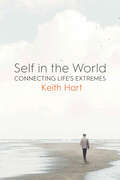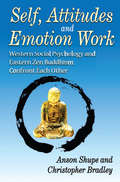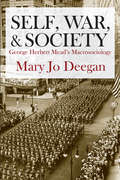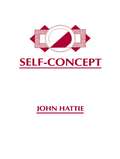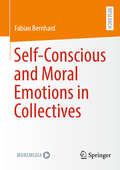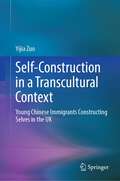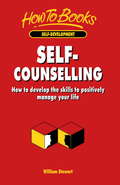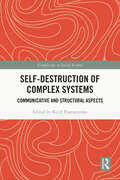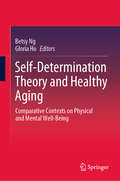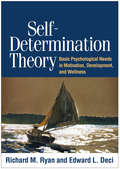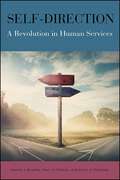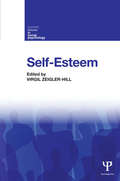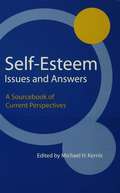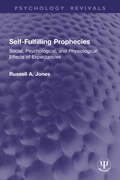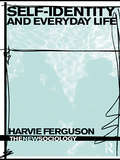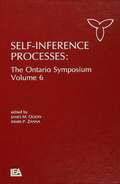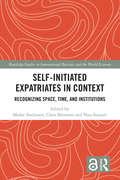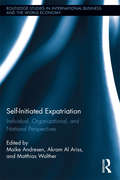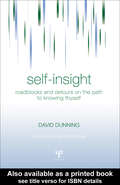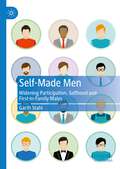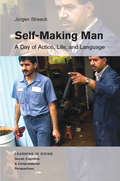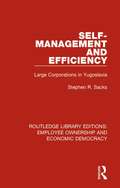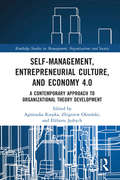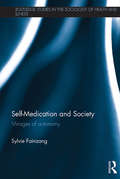- Table View
- List View
Self in the World: Connecting Life's Extremes
by Keith HartEminent anthropologist Keith Hart draws on the humanities, popular culture and his own experiences to help readers explore their own place in history. We each embark on two life journeys – one out into the world, the other inward to the self. With these journeys in mind, anthropologist, amateur economist and globetrotter Keith Hart reflects on a life of learning, sharing and remembering to offer readers the means of connecting life’s extremes – individual and society, local and global, personal and impersonal dimensions of existence and explores what it is that makes us fully human. “This is a work of great originality. Keith Hart has had an unorthodox academic career and it has liberated him in many ways from academic pieties. His background in African ethnography gives him a fascinating angle on all sorts of things, not least the possibility of a more African-influenced global future. The book is full of surprises and mind-shifting observations. I actually couldn't put it down.”—Sherry B. Ortner, UCLA From the introduction: People have many sides, but I will focus here on two. Each of us is a biological organism with a historical personality that together make us a unique individual. But we cannot live outside society which shapes us in unfathomable ways. Human beings must learn to be self-reliant (not self-interested) in small and large ways: no-one will brush your teeth for you or save you from being run over while crossing the street. We each must also learn to belong to others, merging personal identity in a plethora of social relations and categories. Modern ideology insists that being individual and mutual is problematic. The culture of capitalist societies anticipates a conflict between them. Yet they are inseparable aspects of human nature.
Self, Attitudes, and Emotion Work: Western Social Psychology and Eastern Zen Buddhism Confront Each Other
by Christopher BradleyThis book is about how Western social psychology interfaces with an Eastern Zen Buddhist perspective. It is neither a purely Zen Buddhist critique of the former, nor is it merely a social psychological interpretation of Zen. Rather, it is an attempt to create common ground between each through the systematic comparison of certain shared fundamental concepts and ideas. Anglo-American social psychology is not much more than a century old despite having its roots in a broad philosophical tradition. Alternately, the Zen version of Buddhism can trace its historical origins to roughly 1,500 years ago in China. Even though the two arose at different times and at first glance appear stridently antithetical, the authors show that they share considerable areas of overlap. The logic of Zen contemplates the consequences of the taken-for-granted tyranny created by personal memories and culture. These traits, common to every culture, include hubris, greed, self-centeredness, distrust, prejudice, hatred, fear, anxiety, and violence. Social psychology leans more toward a "nurture" rather than "nature" explanation for behavior. Both areas of research are firmly rooted within the domain of sociological social psychology; the processes are also sometimes referred to as learning or conditioning. Zen challenges in radical terms key assumptions of both sociology and psychology concerning individual identity, human nature, and human motivation. This stimulating volume will provoke new thoughts about an old tradition and a newer area of scholarly work.
Self, War, and Society: George Herbert Mead's Macrosociology
by Mary Jo DeeganGeorge Herbert Mead (1863-1931) is a founding figure in the field of sociology. His stature is comparable to that of his contemporaries Emile Durkheim and Max Weber. Mead's contribution was a profound and unique American theory that analyzed society and the individual as social objects. As Mead saw it, both society and the individual emerged from cooperative, democratic processes linking the self, the other, and the community. Mary Jo Deegan, a leading scholar of Mead's work, traces the evolution of his thought , its continuity and change. She is particularly interested in the most controversial period of Mead's work, in which he addressed topics of violence and the nation state. Mead's theory of war, peace, and society emerged out of the historical events of his time, particularly World War I. During this period he went from being a pacifist, along with his contemporaries John Dewey and Jane Addams, to being a strong advocate for war. From 1917-1918 Mead became a leader in voicing the need for war based on his theory of self and society. After the war, he became disillusioned with President Woodrow Wilson, with Americans' failure to support mechanisms for international arbitration, and with the political reasons for American participation in World War I. He returned to a more pacifist and co-operative model of behavior during the 1920s, when he became less political, more abstract, and more withdrawn from public debate. The book includes Deegan's interpretation of Mead's early social thought, his friendship and family networks, the historical context of America at war, and the importance of analysis of violence and the state from Mead's perspective. She also provides illustrative selections from Mead's work, much of which was previously unpublished.
Self-Concept
by John HattieThe aim of this book is to discuss the notions of self-concept, self-esteem, and related terms from an educational and psychological perspective. Specifically, this book is concerned with developing a model of self-concept -- and corollaries to this model -- that assesses the dimensionality of self-concept, reviews tests of self-concept, discusses the relationship between self- concept and other variables (particularly achievement), describes the development of self-concept, and evaluates programs to enhance self-concept. Throughout this volume, emphasis is placed on ordering the many studies using recent methodological advances such as meta-analysis and the analysis of covariance structures. After detailing a conceptual model of self-concept, the book offers various experimental and statistical discussions of the model. Unlike many other models, the claim is not that this model is the correct one but that it may serve as a useful "coathanger" until a better one is devised.
Self-Conscious and Moral Emotions in Collectives
by Fabian BernhardThis book explores self-conscious emotions like guilt and pride and examines their profound influence on individual and collective behaviors. It empirically tests how these emotions, rooted in personal and societal standards, motivate ethical actions and shape group dynamics. A key focus is on collective emotions, such as group-based guilt and pride, which emerge in response to group achievements or wrongdoings. The book provides real-world examples, from historical reckonings to professional and organizational contexts in family businesses, highlighting the impact of these emotions on reconciliation, reputation and moral behaviors. It offers practical implications for managing emotions within groups and organizations.
Self-Construction in a Transcultural Context: Young Chinese Immigrants Constructing Selves in the UK
by Yijia ZuoThis book explores the ways in which individuals construct and integrate self-positions in a transcultural context, by adopting a pluralist theoretical and methodological approach that includes both Western post-modern viewpoints and ancient Chinese philosophical ideas.The book starts with stories of two second-generation Chinese young people and their mothers' life experiences in the UK, which can be seen as an epitome of individuals living in the modern and complex environment of the time. Using social constructionist viewpoints, it then analyzes the overt interaction between the individual and outside environment and interprets the recessive interaction, such as the individual’s psychological response to the outside environment, which might be unknown to him or herself, using the psychodynamic approach based on object relations theory and other psychoanalytic concepts, such as defense mechanisms. The book uses Confucian philosophy to show how Chinese people think about the relation between other people and themselves and also integrates different and even opposing theories and viewpoints from Taoist philosophy.This creative book provides a theoretical and practical approach to explore the conception of “self” and the way in which individuals construct their self-positions in a complex context. Combining cutting-edge Western psycho-social viewpoints and ancient Chinese philosophy, it appeals to readers interested in “self,” psycho-social approaches, psychoanalytic viewpoints and Chinese philosophy.
Self-Counselling: How to develop the skills to positively manage your life
by William StewartFor some, self-counselling may be a valuable substitute for face-to-face counselling, for others it can provide a support to professional counselling sessions. In this practical self-help book, William Stewart introduces many self-counselling skills and techniques and uses case studies, and exercises working with dreams, imagination and intuition, to develop both a deeper self-awareness and the ability to solve propblems.
Self-Destruction of Complex Systems: Communicative and Structural Aspects (Complexity in Social Science)
by Kirill PostoutenkoThis book is the first attempt to provide a general theory of self-destruction in complex systems applicable to natural, social and cultural phenomena.The contributors work collaboratively to prove that many of the nondistributed complex systems in nature and society sooner or later experience critical development leading to unintended and irreversible self-annihilation. The individual chapters also show that the relations of such systems to their own distinctiveness and other systems may result in specific communicative pathologies (such as redundancy, inflation and noisy signalling) which tend to mitigate or reinforce each other, depending on circumstances. Finally, the volume updates some popular models of systemic self-destruction—from autoimmunity and self-organized criticality to imperial overstretch—and discusses some prominent cases (from supernova explosions to the civil war following the Russian Revolution of 1917).The interdisciplinary style of narration ensures the accessibility of the materials and theories presented for the specialists and students from different fields. As such, it will appeal to those interested in complexity studies from the areas of sociology, history, media and communication studies, immunology, computer science, literary criticism, cultural studies, political science and international relations.
Self-Determination Theory and Healthy Aging: Comparative Contexts on Physical and Mental Well-Being
by Betsy Ng Gloria HoThis book pioneers evidence-based research on healthy aging through the application of self determination theory (SDT). Its uniqueness is located in the fact that to date, no other work has applied SDT to the empirical study of aging populations. The authors focus on how SDT drives healthy, successful and active aging, and note that the motivation factors underpinning healthy aging are often neglected, or altogether absent, in the existing literature. This edited volume is particularly timely given the expanding aging crisis in many North American, European and Asian contexts. The collection of chapters meets this challenge head-on in comparing these contexts vis-a-vis a broad international scope, and subsequent discussions on important specialty issues in aging, such as hearing and memory loss. The work offers global perspectives on aging, autonomy and associated life challenges, as well as factors relating to the sustainability of healthy aging in terms of physical and mental well-being. This book will be highly relevant to researchers in the SDT community, as well as specialists in aging and gerontology. It will also be of interest to lifespan psychologists and developmental psychologists.
Self-Determination Theory: Basic Psychological Needs in Motivation, Development, and Wellness
by Edward L. Deci Richard M. RyanSelf-determination theory (SDT) provides a framework for understanding the factors that promote motivation and healthy psychological and behavioral functioning. In this authoritative work, the codevelopers of the theory comprehensively examine SDT's conceptual underpinnings (including its six mini-theories), empirical evidence base, and practical applications across the lifespan. The volume synthesizes a vast body of research on how supporting--or thwarting--people's basic needs for competence, relatedness, and autonomy affects their development and well-being. Chapters cover implications for practice and policy in education, health care, psychotherapy, sport, and the workplace.
Self-Direction: A Revolution in Human Services
by Kevin J. Mahoney Valerie J. Bradley Marc H. FentonIn the past, when people with disabilities and older adults needed help with activities of daily living and navigating their communities, they rarely had any choice about who helped them, when that support was delivered, or what the worker would or would not do. The self-direction movement changed all that by offering people the option to select their own workers and even create an individualized budget to help them live more independently. Written by experts who played a key part in the growth, evaluation, and dissemination of this revolutionary approach, Self-Direction describes the development of this movement through the authors' personal accounts. Also included are stories from actual participants in the movement who benefitted from this approach and from policymakers who saw how self-direction could help address states' problems. The book's conclusion discusses recommendations that can improve the way self-direction is delivered and how to spread its message so that all people with disabilities can have this choice.
Self-Esteem
by Virgil Zeigler-HillIn this edited collection a distinguished set of contributors present a broad overview of psychological research on self-esteem. Each chapter is written by leading experts in the field, and surveys current research on a particular issue concerning self-esteem. Together, the chapters provide a comprehensive overview of one of the most popular topics in psychology. Each chapter presents an in-depth review of particular issues concerning self-esteem, such as the connection that self-esteem has with the self-concept and psychological adjustment. A number of further topics are covered in the book, including: How individuals pursue self-esteem The developmental changes in feelings of self-worth over the life span. The existence of multiple forms of high self-esteem The role that self-esteem plays as an interpersonal signal The protective properties associated with the possession of high self-esteem This collection of state-of-the-art reviews of key areas of the psychological literature on self-esteem will be of great interest to researchers, and academics, and also to graduate and advanced undergraduate students of social psychology.
Self-Esteem Issues and Answers: A Sourcebook of Current Perspectives
by Michael H. KernisResearch and theory on self-esteem have flourished in recent years. This resurgence has produced multiple perpectives on fundamental issues surrounding the nature of self-esteem and its role in psychological functioning and interpersonal processes. Self-Esteem Issues and Answers brings together these various perspectives in a unique format. The book is divided into five sections. Section I focuses on core issues pertaining to the conceptualization and assesment of self-esteem, and when self-esteem is optimal. Section II concentrates on the determinants, development, and modifiability of self-esteem. Section III examines the evolutionary significance of self-esteem and its role in psychological processes and therapeutic settings. Section IV explores the social, relational, and cultural significance of self-esteem. Finally, Section V considers future directions for self-esteem researchers, practitioners, parents and teachers. This volume offers a wealth of perspectives from prominent researchers from different areas of psychology. Each expert contributor was asked to focus his or her chapter on a central self-esteem issue. Three or four experts addressed each question. The result is that Self-Esteem Issues and Answers provides a comprehensive sourcebook of current perspectives on a wide range of central self-esteem issues.
Self-Fulfilling Prophecies: Social, Psychological, and Physiological Effects of Expectancies (Psychology Revivals)
by Russell A. JonesOriginally published in 1977, Self-Fulfilling Prophecies: Social, Psychological, and Physiological Effects of Expectancies integrates a wide variety of research and theory dealing with inter- and intrapersonal expectancies, from which the author develops a new theoretical model. The model explores the relationships between a person’s expectation of success and both the objective probability of success and the effort expended in pursuit of the goal. The author also explores in detail the interdependence of one’s interpersonal expectancies (as in implicit personality theories, stereotypes, and the labeling approach to deviant behavior), and an individual's personal goals. With the development of the theoretical model, the author critically reviews the literature on performance and goal-seeking behavior at the time. Finally, the influences of expectancies on susceptibility to illness, placebo effects, and psychosomatic disease are discussed.This will be a volume of interest to all concerned with human motivation and goal-seeking behavior and today can be read in its historical context.
Self-Identity and Everyday Life (The New Sociology)
by Harvie Ferguson'Identity' and 'selfhood' are terms routinely used throughout the human sciences that seek to analyze and describe the character of everyday life and experience. Yet these terms are seldom defined or used with any precision, and scant regard is paid to the historical and cultural context in which they arose, or to which they are applied. This innovative book provides fresh historical insights in terms of the emergence, development, and interrelationship of specific and varied notions of identity and selfhood, and outlines a new sociological framework for analyzing it.This is the first historical/sociological framework for discussion of issues which have until now, generally been treated as 'philosophy' or 'psychology', and as such it is essential reading for those undergraduates and postgraduates of sociology, philosophy and history and cultural studies interested in the concepts of identity and self. It covers a broader range of material than is usual in this style of text, and includes a survey of relevant literature and precise analysis of key concepts written in a student-friendly style.
Self-Inference Processes: The Ontario Symposium, Volume 6 (Ontario Symposia on Personality and Social Psychology Series)
by James M. Olson Mark P. ZannaAlthough self-inference processes -- the ways individuals make judgments about themselves -- have been studied in social psychology and sociology for many years, a distinct literature on this topic has not emerged due to the diversity of relevant issues. The editors of this current volume cull recent social psychological research and theory on self-inference processes and identify some of the common themes in this area of study. The specific topics covered in this volume include: ` how people infer their emotions, personality traits, and body images from relevant information * factors influencing the self-concept, identity, and self-standards * the impact of self-inferences on interpersonal relations * conditions motivating escape from the self The book is written for researchers and graduate level students in clinical, social, developmental, health, and personality psychology.
Self-Initiated Expatriates in Context: Recognizing Space, Time, and Institutions (Routledge Studies in International Business and the World Economy)
by Maike Andresen; Chris Brewster; Vesa SuutariThis edited volume builds on the previously published Self-Initiated Expatriation: Individual, Organizational, and National Perspectives, which served to give in-depth insights into the concept and the processes of self-initiated expatriation and presented different groups undertaking self-initiated foreign career moves. While more than a hundred articles on self-initiated expatriation (SIE) have been published in the meanwhile, an examination of the research questions and samples of SIEs in published SIE research shows that the role of context and its impact on SIEs’ career-related decisions and behaviors has not been explored sufficiently. This raises the question in how far existing research results are comparable. The aim of this follow-up volume is to deepen the understanding of SIEs’ careers, focusing on the contextual influences of space, time, and institutions on the heterogeneous SIE population. More specifically, the editors aim to shed light on spatial conditions in terms of the home and host country conditions on the self-initiated expatriation experience and examine developments over time in terms of temporality of conditions and SIEs’ life-course. Moreover, the influence of the institutional context in terms of occupational, organisational, and societal specificities will be analysed. All chapters are based on strong theoretical foundations that serve to conceptualise "context" and are written by both established and emerging global academics and researchers. Self-Initiated Expatriates in Context contributes to conceptual clarity in the burgeoning field of SIE research by drawing attention to the importance of exploring context and, thus, boundary conditions to careers. It offers specific guidance for an improvement of future SIE-related research in order to enhance the validity of future empirical studies as well as for an improvement of managerial practice. It will be of interest to researchers, academics, practitioners, and students in the fields of international business, human resource management, organisational studies, and strategic management.
Self-Initiated Expatriation: Individual, Organizational, and National Perspectives (Routledge Studies in International Business and the World Economy #54)
by Akram Al Ariss Maike Andresen Matthias WaltherGlobalization and the development of multinational organizations have led to an increase in the number of people spending part of their lives living and working in foreign countries. While the contemporary literature has focused on organizational expatriates sent overseas by their employers, self-initiated expatriation is becoming an important area of study in its own right. Studies on self-initiated expatriation explore the labor market positions of individuals who have relocated under their own initiative. However, no comprehensive book exists on the dynamics that underlie this type of mobility. This edited volume offers a holistic picture of self-initiated expatriation and the groups that pursue it, emphasizing many aspects for departure including career development and career capital. It is the first book on the market to explore the issues pertaining to self-initiated expatriation from a variety of perspectives with important theoretical and practical implications. In an era of global war for talent, companies face difficulties in finding highly skilled employees. Self-initiated expatriates have the potential to fill this talent gap. National economies thus have an interest in creating favorable conditions to attract self-initiated expatriates and provoke their repatriation, and this book explores the conditions that achieve the return of employees with skills that are in demand outside of their home countries.
Self-Insight: Roadblocks and Detours on the Path to Knowing Thyself (Essays in Social Psychology)
by David DunningPeople base thousands of choices across a lifetime on the views they hold of their skill and moral character, yet a growing body of research in psychology shows that such self-views are often misguided or misinformed. Anyone who has dealt with others in the classroom, in the workplace, in the medical office, or on the therapist’s couch has probably experienced people whose opinions of themselves depart from the objectively possible. This book outlines some of the common errors that people make when they evaluate themselves. It also describes the many psychological barriers - some that people build by their own hand - that prevent individuals from achieving self-insight about their ability and character. The first section of the book focuses on mistaken views of competence, and explores why people often remain blissfully unaware of their incompetence and personality flaws. The second section focuses on faulty views of character, and explores why people tend to perceive they are more unique and special than they really are, why people tend to possess inflated opinions of their moral fiber that are not matched by their deeds, and why people fail to anticipate the impact that emotions have on their choices and actions. The book will be of great interest to students and researchers in social, personality, and cognitive psychology, but, through the accessibility of its writing style, it will also appeal to those outside of academic psychology with an interest in the psychological processes that lead to our self-insight.
Self-Made Men: Widening Participation, Selfhood and First-in-Family Males
by Garth StahlThis book explores how boys from low-socioeconomic status backgrounds disengage from their education, and are resultantly severely underrepresented in post-compulsory education. For those who attend university, many will be first-in-their-family. As first-in-family students, they may encounter significant barriers which may limit their participation in university life and their acquisition of social and cultural capital. Drawing on a longitudinal study of young Australian men pursuing higher education, the book provides the first detailed account of socially mobile working-class masculinities. Investigating the experiences of these young men, this book analyses their acclimatisation to new learning environments as well as their changing subjectivities. The monograph draws on various sociological theories to analyse empirical data and make practical recommendations which will drive innovation in widening participation initiatives internationally. This book will be of interest to scholars interested in widening participation, transitions, social mobility and Critical Studies of Men and Masculinities.
Self-Making Man: Social, Cognitive and Computational Perspectives)
by Jürgen StreeckThis book portrays one day in the communicative life of the owner of an auto repair-shop in Texas. He walks, looks, points, shows and explains engines, makes sense by gesture, speaks, manages, makes his life-world, and in the process reproduces social structures and himself as individual. Self-Making Man is the first comprehensive study of a communicating person; it reveals socially shared and personal practices, as well as improvisational actions by which a person inhabits and makes sense of the world with others. After decades of discussion on embodiment, this study is the first to investigate one body in its full range of communicative activities. Grounded in phenomenology and committed to the methodological rigor of context analysis and conversation analysis, Self-Making Man departs radically from contemporary research practice: it shows that, to take embodiment in human interaction seriously, we must conceive of it as individuation and organic, self-sustaining life: as autopoeisis. Proposes a new perspective on embodiment in social interaction. Rich in ethnographic detail and shows how all of the human senses are deployed moment by moment in 'sense-making' and social interaction. Provides new empirical insights into communication modalities (gaze, gesture, speech, etc.) and their roles in social interaction.
Self-Management and Efficiency: Large Corporations in Yugoslavia (Routledge Library Editions: Employee Ownership and Economic Democracy #12)
by Stephen R. SacksThe book, first published in 1983, examined whether the Yugoslavs’ extensive implementation of their principle of self-management by small work units was costly in terms of economic efficiency. Were they atomizing their firms into inefficiently small fragments? Was the system of worker self-management appropriate only for small firms? Can a modern industrial enterprise of efficient scale, indeed very large scale, by run that way? In order to answer these questions, the author applies to large firms in former Yugoslavia the transactions cost analysis developed by the economist Oliver Williamson.
Self-Management, Entrepreneurial Culture, and Economy 4.0: A Contemporary Approach to Organizational Theory Development (Routledge Studies in Management, Organizations and Society)
by Agnieszka RzepkaThis book offers practical insight into the changing ways in which organizations operate today. Building on a groundbreaking concept of teal organizations, the book illustrates the practicality of advocating a lack of hierarchy of predetermined positions and the introduction of roles that come with clear responsibilities constantly defined according to current needs. First described by Frederic Laloux, a teal organization is a ground-breaking approach to managing organizations that is being adopted around the world, which turns everyone into a leader. This new paradigm rests on the ideas of wholeness, evolutionary purpose, employee autonomy, and self-management based on peer relationships. Its main assumption is the empowerment of the employee resulting in a change in workplace relationships and a more soulful and purposeful work environment. Drawing on the authors’ research across six different countries, it presents the evolution of self-management and entrepreneurial culture in the current age of Economy 4.0 and examines how the teal concept has been implemented around the world. It examines misconceptions surrounding this novel approach and diagnoses the practical problems connected with implementing it in the current uncertain times. It will be of value to researchers, academics, managers, and students in the fields of management and organizational studies.
Self-Management, Entrepreneurial Culture, and Economy 4.0: A Contemporary Approach to Organizational Theory Development (Routledge Studies in Management, Organizations and Society)
by Agnieszka RzepkaThis book offers practical insight into the changing ways in which organizations operate today. Building on a groundbreaking concept of teal organizations, the book illustrates the practicality of advocating a lack of hierarchy of predetermined positions and the introduction of roles that come with clear responsibilities constantly defined according to current needs. First described by Frederic Laloux, a teal organization is a ground-breaking approach to managing organizations that is being adopted around the world, which turns everyone into a leader. This new paradigm rests on the ideas of wholeness, evolutionary purpose, employee autonomy, and self-management based on peer relationships. Its main assumption is the empowerment of the employee resulting in a change in workplace relationships and a more soulful and purposeful work environment.Drawing on the authors’ research across six different countries, it presents the evolution of self-management and entrepreneurial culture in the current age of Economy 4.0 and examines how the teal concept has been implemented around the world. It examines misconceptions surrounding this novel approach and diagnoses the practical problems connected with implementing it in the current uncertain times. It will be of value to researchers, academics, managers, and students in the fields of management and organizational studies.
Self-Medication and Society: Mirages of Autonomy
by Sylvie FainzangThe question of recourse to self-medication arises at the intersection of two partly antagonistic discourses: that of the public authorities, who advocate the practice primarily for economic reasons, and that of health professionals, who condemn it for fear that it may pose a danger to health and dispossess the profession of expertise. This books examines the reality of self-medication in context and investigates the social treatment of the notion of autonomy ever present in the discourses promoting this practice. Drawing on fieldwork conducted in France, the author examines the material, cognitive, symbolic and social dimensions of the recourse to self-medication, considering the motivations and practices of the subjects and what these reveal about their relationship with the medical institution, while addressing the question of open access to medicines – a subject of heated debate between the actors concerned on themes such as competence, knowledge and responsibility. A rigorous analysis of the strategies adopted by individuals to manage the risks of medicines and increase their efficacy, Self-Medication and Society will appeal to sociologists and anthropologists with interests in health, illness, the body and medicine.
